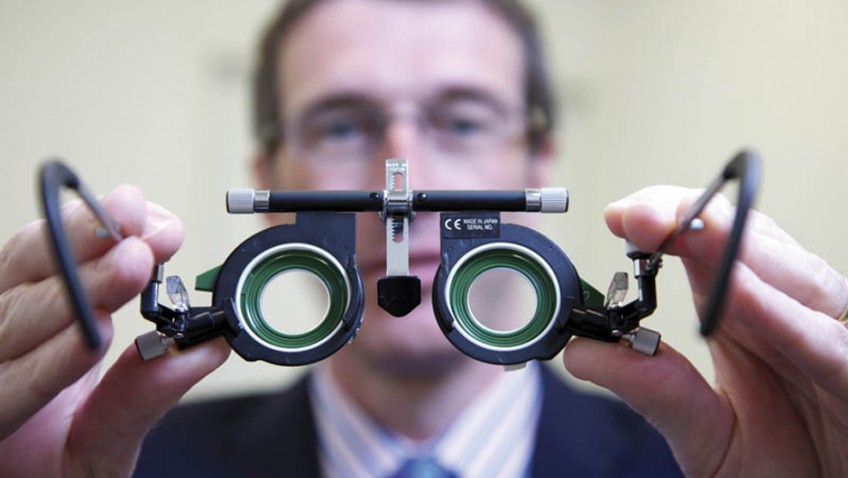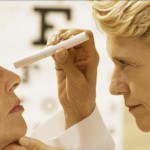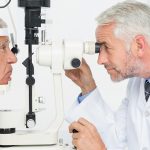College of Optometrists funded study comparing over 300 pairs of spectacles – found participants prefer shop bought spectacles over those bought online
A study commissioned by The College of Optometrists (UK) found that, when comparing spectacles bought online and those bought and fitted in optometric practices, customers preferred shop bought spectacles.
The study, published in the leading American journal Optometry and Vision Science, compared over 300 pairs of spectacles; those bought online and those purchased in retail shops, where they were fitted by practice staff. All were worn by survey participants and then assessed at the eye clinic of the University of Bradford, UK where it was found that participants ranked shop bought spectacles, fitted by practice staff, significantly higher overall than those bought online.
Mike Bowen, Director of Research for the College of Optometrists, said: “This study is important, not just because it’s the first of its kind, but because of the rise in online purchasing. Customers need to understand that it’s not just the prescription that’s important in selecting a pair of spectacles but that a specialist such as an optometrist or dispensing optician can also guide you on the shape, fit and appropriateness of a certain pair of spectacles over another. Patients need to understand the possible adverse effects if spectacles are not supplied correctly.”
The key College of Optometrists study findings are:
- Participants preferred shop bought spectacles dispensed by practice staff, ranking them significantly higher overall than those bought online. This was particularly true of more complex prescriptions, such as Progressive Addition Lenses (PALs, also known as varifocals), which are often worn by the elderly.
- Researchers found a higher rate of spectacles bought online were classed as unacceptable or unsafe due to incorrect measurements of pupillary distances (the distance between the eyes, measured between the centre of the pupils). When ordering online, pupilary distance is usually measured and supplied by the customer and the measurements provided can be inaccurate.
- 79% of participants said they would purchase their next pair of spectacles from the high street. The remaining 21% indicated they would purchase their next pair online cited convenience, clarity in pricing, significantly lower prices and the lack of pressure to purchase amongst their reasoning.
- The average cost of online spectacles was significantly lowerthan the high street spectacles used in this research.
- 6% of all study spectacles were classified as unsafe. 78% of spectacles perceived as unsafe came from online suppliers. For 50% of these spectacles, the issue was due to the fit of the frame rather than the accuracy of the lens prescription.
- Significantly more online spectacles (30%) were classed as unacceptable by participants than practice bought and fitted spectacles (10%), largely due to fit and appearance.
What does this mean for spectacle wearers?
- If you are buying glasses online it’s very important to ensure that your pupillary distance is measured correctly. Pupillary distance will not be included in a prescription given to you by your optical professional. It is one of the measurements that will be taken by the person dispensing your spectacles as part of the dispensing process.
- It is recommended that online purchasing of bifocals and PALs (varifocals) is avoided as they require careful fitting because of the increased risk of falls in these spectacles in frail, elderly patients.
- Once you have your prescription, you are free to purchase your glasses from any supplier. However, as prescribing and dispensing of spectacles are closely linked it is best to have your spectacles dispensed where you have your eyes examined. It is often more difficult to resolve any problems you may have with your spectacles when prescribing and supply are separated.
- Remember, wherever you purchase your spectacles, you still need regular eye examinations to make sure that your eyes are healthy.
How the research was completed
A total of 33 participants completed the study and compared 309 pairs of spectacles. Participants purchased spectacles from both a random sample of five of the most easily accessed online spectacle retailers and five high street practices of their choice. The participants then wore each pair for at least two hours over a 2-3 day period, and completed a questionnaire on vision, comfort, fit, and how acceptable and safe the spectacles felt. All of the participants and spectacles were assessed at the University of Bradford eye clinic for clarity of vision, ocular muscle balance (testing the function of the eye muscles), and fit and quality of the spectacle frames and lenses.
When choosing an optometrist, look for the letters FCOptom or MCOptom after their name. It means that the optometrist is a fellow or member of the College and adheres to high standards of clinical practice. You can find your local member of the College of Optometrists on Look After Your Eyes.




